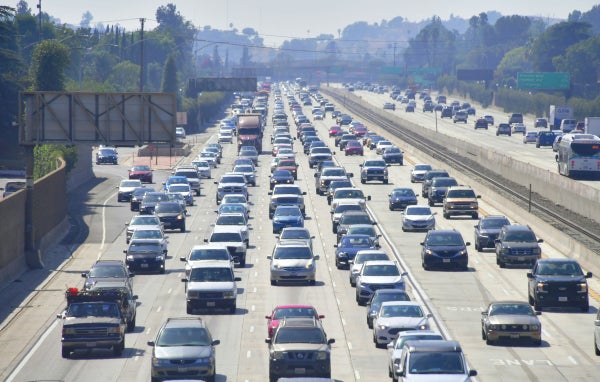Revoking California’s Clean Air Act waiver would let greenhouse gas emissions soar and electric vehicle sales plummet, new research shows.
The analysis by the economic consulting firm Rhodium Group examined the climate impact of the Trump administration’s planned rollback of Obama-era clean car standards.
The rollback has two main components. It would freeze fuel economy standards at 2020 levels through 2026, allowing cars to travel much shorter distances on one tank of gas, and would revoke California’s Clean Air Act waiver for greenhouse gases, which lets the state set tougher emissions rules than those of the federal government.
On supporting science journalism
If you're enjoying this article, consider supporting our award-winning journalism by subscribing. By purchasing a subscription you are helping to ensure the future of impactful stories about the discoveries and ideas shaping our world today.
If the administration pursues only the first component, an additional 493 million to 684 million metric tons of carbon dioxide will enter the atmosphere, the research found.
But if the administration pursues both components as planned, CO2 emissions will soar by an additional 1,055 million to 1,317 million metric tons.
The analysis found a similar effect on sales of zero-emission vehicles, including plug-in hybrid and battery-electric models.
If the administration freezes only fuel economy standards, there will be 6 million to 7 million fewer ZEVs on the road.
But if the administration freezes the standards and revokes California’s Clean Air Act waiver, ZEV sales will plummet by 12 million to 14 million.
Emily Wimberger, a climate economist at Rhodium Group and lead author of the research, said the findings show the “outsized impact” of the California waiver.
“The difference between the California waiver being revoked and the waiver remaining in place is pretty large,” said Wimberger, a former chief economist at the California Air Resources Board.
Ultimately, the findings highlight the importance of the California waiver to meeting global temperature targets.
In the 2015 Paris Agreement, nations pledged to limit warming to “well below” 2 degrees Celsius above preindustrial levels. But in a landmark report last year, the Intergovernmental Panel on Climate Change warned that countries must limit warming to 1.5 C or risk abandoning billions of people to the runaway impacts of climate change.
“When we’re thinking about trying to reach long-term climate targets, the California waiver really does change the trajectory of where we’re going and really could put us off track to get below 1.5 degrees Celsius,” Wimberger said.
Wimberger also noted that the average life span of a vehicle is 12 years, so if ZEV sales plateau now, future generations will feel the effects.
“Because vehicles have a 12-year life expectancy, every ZEV that’s not put on the road now means we’re going to continue to rely on petroleum-based vehicles far into the future,” she said.
EPA and the National Highway Traffic Safety Administration have not yet finalized the two components of the rollback. The two agencies are expected to wrap up their work in November or December.
EPA didn’t respond to a request for comment.
Reprinted from Climatewire with permission from E&E News. E&E provides daily coverage of essential energy and environmental news atwww.eenews.net.
